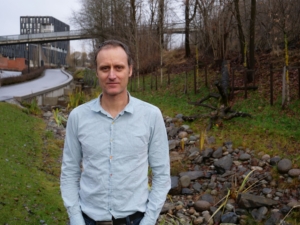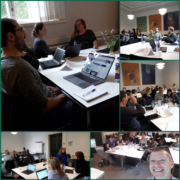Climate researcher: You evolve on Twitter as your followers evolve
For Glen Peters, Twitter is integrated into his working day: It lets him, for example, get more ‘miles out of’ all the graphs, figures and tables that otherwise might not end up in finished papers.
Doing science involves a constant commentary on digitalized figures, tables and tabulated numbers. And by sharing this work with your peers on Twitter, you can get feedback on these figures and tables as you go along. This is according to Glen Peters, Research Director at CICERO, a Norwegian climate research institute, whose own research is on things like the global carbon cycle, climate policy and emissions.

Glen Peters at the University of Oslo (Photo: Hege Fantoft Andreassen — CICERO)
Glen Peters is ranked as one of the top scientists in Norway in terms of social media following on the just-released Mike Young Academy Twi-Li Index for 2022, and has 45,700 followers on Twitter at last count. He is originally from Australia, and lives permanently with his family in Oslo.
Without Twitter, “you would quite often end up reinventing the wheel”
“You work with lots of figures and ideas that may or may not end up in a finished scientific paper. One way to get more miles out of these is to tweet about them. I used to be more active writing a blog post, and my Twitter feed is an excellent supplement to that,” he told me when I called him in connection with the Twi-Li Index release.
Below is a random tweet selected from Glen Peter’s Twitter feed which, as he explains, has “an older figure, to bring out a bit of info people have overlooked.”
The Paris Agreement was adopted in 2015, 7 years ago.
Did you know that global fossil CO₂ emissions are still 3% above 2015 levels, despite the big drop in emissions because of the COVID lockdowns in 2020.
We are still heading in the wrong direction… pic.twitter.com/pkSvxFkW0j
— Glen Peters (@Peters_Glen) May 7, 2022
The crafting of tweets surrounding a new piece of climate data is a part of his thinking work. Without Twitter, “you would quite often end up reinventing the wheel,” he says. But colleagues in the climate field will quickly point out how to improve his ideas.
And it is not just your ideas that are evolving in this process, according to Glen Peters.
Glen Peters: “You are evolving and your followers are evolving in their understanding of climate”
He describes how his Twitter routine “takes my followers along my journey.” As you share thoughts and ideas, your followers are evolving with you, on their own parallel trajectories. The general understanding of a whole research field evolves alongside you.
“A tweet that a year ago might get 100 retweets might get zero today. This is because you are evolving. And it is because your followers are evolving in their understanding of climate,” he says.
As a climate scientist, Glen Peters discussions on Twitter could be on things like: “What are the emissions of this country? How do you show that? How do you show what is happening now, as opposed to what is happening two years ago?” A tweet could be “over emissions scenarios, or a graphic on how energy systems might evolve,” he says, adding that he only tweets research-related material, never personal opinions.
“This may or may not be the optimal strategy, but this works for me,” he says.
Below is one of Glen Peter’s tweets (go ahead and click on the video button in the tweet if it does not load) that, he “tweeted a Friday afternoon, not expecting any retweets, but Greta Thunberg saw it,” he says.
How big is the CO₂ bucket for 1.5°C?
Well, the bucket is about to overflow in a few short years, unless we:
1. Turn off the tap (urgently)
2. Put a hole in the bottom to remove CO₂ (negative emissions)#COP25 #CarbonBudget @FutureEarth @gcarbonproject https://t.co/ycYcuFSPdF pic.twitter.com/o7JwZt7GlX— Glen Peters (@Peters_Glen) December 13, 2019
Glen Peters has a good LinkedIn following with a partly different, partly overlapping audience. His followers are mostly working on climate finance, or working on companies’ environmental, social, and governance policies.
But Twitter is the platform that is most integrated into Glen Peter’s working day. He used to use Tweetdeck for scheduling tweets, but now schedules natively on the Twitter app, he says:
“I have a strategy where I try to tweet at least once a day to keep it regular. I often schedule tweets, so that they come out around 8 or 9 in the European morning, also early afternoon, and this ties in well with the North American morning.“
See the top 100 scientists on social media in Norway 2022 list here.
Does your department, faculty or university need to boost the international impact and career of your researchers? Here is more about my courses in social media for researchers. See other Mike Young Academy services here.












Leave a Reply
Want to join the discussion?Feel free to contribute!